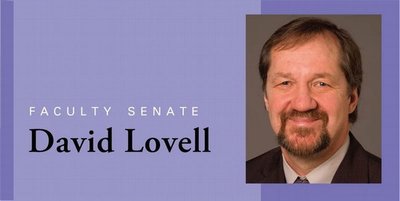February 22, 2007
Faculty Senate: State budget looks good for higher ed.
For the first time in many years, the state Legislature appears likely to pass a budget that will reverse the trend of declining support for public higher education in general and the UW in particular. This welcome change is partly due to favorable state revenues, but also to a renewed recognition of the value of higher education to the state’s economic well-being.
For the UW, this recognition is the primary benefit of the governor’s Washington Learns process. For those interested in how policymakers perceive the role of higher education, it is worth a visit to the Washington Learns Web site to review the final report and to glance at the trainload of supporting reports. A specific result of Washington Learns is that we now have a new group of “global challenge states” and peer institutions to compare ourselves with; reaching competitive levels of per-student funding within this group would constitute a major increase in resources — not incidentally, including faculty salaries — needed to continue the quality of teaching and research we have achieved.
The primary vehicle for faculty participation in legislative policy is the Council of Faculty Representatives: the delegates chosen by the Senates or faculty governance associations of the six public baccalaureate institutions. On issues that affect all the public universities, we attempt to speak as a group. We have joined the policy consensus on resources both for broader educational opportunity and for higher levels of per capita funding. Because of the favorable budget picture, however, we have focused more on other issues. What are they?
First, that we exist: faculty have legal governing bodies or senates, we are empowered to govern the institution along with the administration, and we have representatives who work with the Legislature.
Second, that in sharing governance at our institutions we bear primary responsibility for setting admissions and degree requirements, hiring and promoting faculty, and maintaining academic standards.
Third, and consequently, that educational policy will benefit and our contributions to each institution will be more effective if faculty are represented in the policy process: on the Higher Education Coordinating (HEC) Board, on institutional governing boards (in the UW’s case, the Board of Regents), on stakeholder groups convened to define resources, enrollment and degree production requirements for “high demand” markets — in areas such as computer science, engineering, and health care — and in defining the measures (such as degree production) for which universities will be held accountable by the state. These are each matters of proposed legislation this session. It is anyone’s guess whether the Legislature will include formal representation of faculty on the HEC Board, but it’s likely that an advisory committee that includes us by statute will be continued. In the case of membership on institutional governing boards, the UW faculty’s deputy representative, J.W. Harrington, has carried the ball by crafting a bill that will be sponsored by the chair of the Senate Higher Education Committee and several other legislators. It appears that the bill creating a “high demand” stakeholder study group will be amended to include a faculty representative. For the time being, accountability measures are negotiated as part of the Governor’s budget process, so it will be up to faculty at each university to help define measures proposed by the institution.
On faculty salaries, four of the six institutions now have faculty unions — jointly organized as the United Faculty of Washington State — which has its own professional advocates working in conjunction with representatives of the community and technical college unions. Discussions have acquired a new dimension because many four-year institution faculty are now represented both by a union and by delegates from the faculty senates. A union-supported bill, SB5514, led to a balancing act in which the Council of Faculty Representatives endorsed the principle of pay equity and job security for part-time and contingent faculty, while criticizing specific requirements as unworkable. We’re now hopeful that our role will have been constructive, and that the bill will be amended to remove specific requirements for four-year institutions while requiring them to come up with measures and plans to respond to the need for equitable treatment.
These and other issues will remain prominent for the next several legislative sessions. During breaks between sessions, your faculty representatives are interested in meeting with faculty groups, in schools and departments, to explain and discuss issues in more detail. We are asking for the support of other faculty to arrange these conversations and help us fairly represent faculty concerns.
David Lovell is the Faculty Legislative Representative for the UW Faculty Senate.

